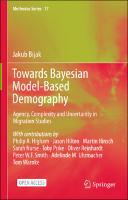Towards Bayesian Model-Based Demography
Agency, Complexity and Uncertainty in Migration Studies
Abstract
This open access book presents a ground-breaking approach to developing micro-foundations for demography and migration studies. It offers a unique and novel methodology for creating empirically grounded agent-based models of international migration – one of the most uncertain population processes and a top-priority policy area. The book discusses in detail the process of building a simulation model of migration, based on a population of intelligent, cognitive agents, their networks and institutions, all interacting with one another. The proposed model-based approach integrates behavioural and social theory with formal modelling, by embedding the interdisciplinary modelling process within a wider inductive framework based on the Bayesian statistical reasoning. Principles of uncertainty quantification are used to devise innovative computer-based simulations, and to learn about modelling the simulated individuals and the way they make decisions. The identified knowledge gaps are subsequently filled with information from dedicated laboratory experiments on cognitive aspects of human decision-making under uncertainty. In this way, the models are built iteratively, from the bottom up, filling an important epistemological gap in migration studies, and social sciences more broadly.
Keywords
Open access; Agent-based modelling; Bayesian demography; Migration modelling; Model-based approaches; Uncertainty quantification; Forced migration; Computational experiments; Model calibration and sensitivity; Free accessDOI
10.1007/978-3-030-83039-7ISBN
9783030830397, 9783030830397Publisher
Springer NaturePublisher website
https://www.springernature.com/gp/products/booksPublication date and place
Bern, 2022Imprint
Springer International PublishingSeries
Methodos Series, 17Classification
Population and demography
Social research and statistics
Migration, immigration and emigration
Relating to migrant groups / diaspora communities or peoples


 Download
Download Web Shop
Web Shop